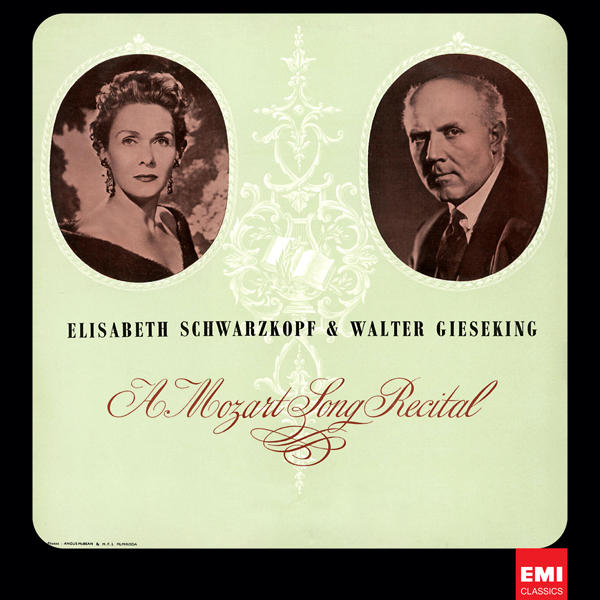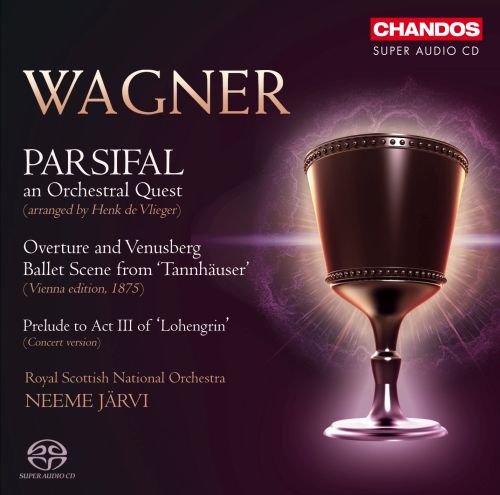
Wolfgang Amadeus Mozart – A Mozart Song Recital – Elisabeth Schwarzkopf, Walter Gieseking (1956/2012)
FLAC (tracks) 24 bit/96 kHz | Time – 49:13 minutes | 990 MB | Genre: Classical
Studio Master, Official Digital Download | Source: e-onkyo | @ EMI Classics
Recorded: 13, 14 &16 April 1955, Abbey Road Studios, London
The daughter of a teacher, Elisabeth Schwarzkopf began to study voice in 1934 at the Berliner Musikhochschule with Lula Mysz-Gmeiner and with Maria Ivogun. She also studied lieder interpretation with Michael Raucheisen, Ivogun’s husband. In 1938, Schwarzkopf debuted in Berlin as a Flower Maid in Parsifal. She remained in Berlin until 1944 when she joined the Vienna State Opera making her debut as Zerbinetta in Ariadne auf Naxos. Her first international appearances were in 1947 at London with the Vienna State Opera on tour as Donna Elvira in Don Giovanni and Marzelline in Fidelio. She became a regular guest at Covent Garden. That same year she made her debut at the Salzburg Festival and she appeared there nearly every year until 1964. At Salzburg she was best known for her Mozart roles of Donna Elvira, Countess in Le nozze di Figaro and Fiordiligi in Così fan tutte, but also had great success as Alice Ford in Falstaff and the Marschallin in Der Rosenkavalier. Her recitals with Gerald Moore as accompanist at Salzburg were always highly regarded, but in 1953 the great conductor Wilhelm Furtwängler accompanied her in an all Wolf recital. Her Teatro alla Scala debut in 1949 as the Countess in Le nozze di Figaro was a great success and she sang there until 1964 in a variety of roles including Melisande, Carmina burana, Catulli Carmina, and Il Trionfo of Orff, Elisabeth in Tannhäuser, Elsa in Lohengrin, Anne in The Rake’s Progress, Iole in Handel’s Hercules, as well as her Mozart and Strauss roles. She made her San Francisco Opera debut in 1955, but did not sing at the Metropolitan Opera until 1964. Her belated debut there is attributed to her ties to the National Socialist regime in Germany and Austria.
As great as her reputation as an opera singer was, her work on the recital and concert stage had even higher acclaim. Her fame as a recitalist was matched only by that of Dietrich Fischer-Dieskau. Her appearances were eagerly awaited around the world. In particular, her interpretations of the songs of Schubert, Strauss, and Wolf were admired. She is one of the few singers who was able to fulfill all of the requirements of an evening devoted to the songs of Wolf. On the concert stage she was often heard in cantatas and Passions of Bach, as well as the Verdi Requiem and symphonies of Mahler.
The voice of Elisabeth Schwarzkopf in her very early career was a light high soprano with excellent control of fioritura and breath control. As she matured, the middle and lower registers became much stronger and she began to sing more dramatic scores while giving up the lighter roles. By the late 1950s, she concentrated her operatic appearances on five or six roles to which she devoted great energy developing her interpretations to their highest level. This attention to detail and constant probing for added interpretive depth is the reason some writers find her performances too mannered and studied. In the recording studio, where she would work for hours perfecting one phrase, she was aided by her husband, record producer Walter Legge, in finding the perfect vocal color and phrasing to illuminate each piece. Even her most vocal critics stand in awe of the hard work that she brought to bear on even the simplest of songs. It is as a Mozart, Strauss and Wolf interpreter that Elisabeth Schwarzkopf will always be remembered. -Artist Biography by Richard LeSueur
About the Mastering
Four engineers at Abbey Road Studios in London have remastered these historic EMI recordings from their original analogue sources for release in pristine hi-def. Between them, Simon Gibson, Ian Jones, Andy Walter and Allan Ramsay have many years of experience remastering archive recordings for EMI and other record labels. The process always starts with finding all of the records and tapes in EMI’s archive in London and comparing different sources and any previous CD reissues. We consult each recording’s job file, which contains notes about the recording made by the engineer and producer. For example, this sometimes explain why there is more than one set of tapes to choose from. All of the tapes are generally in good condition and we play them on our Studer A80 π inch tape machine, after careful calibration of its replay characteristics.
In order to have the best digital remastering tools at our disposal for the remastering, we transfer from analogue to the digital domain at 96 KHz and 24-bit resolution using a Prism ADA-8 converter and capture the audio to our SADiE Digital Audio Workstation.
Tracklist:
Wolfgang Amadeus Mozart (1756-1791)
1 Ridente La Calma, K. 152 3:15
2 Oiseaux, so tous es ans, K. 307 1:20
3 Dans un Bois Solitaire, K. 308 3:00
4 Die Kleine Spinnerin, K. 531 1:44
5 Als Luise die Briefe, K. 520 1:55
6 Abendempfindung, K. 523 5:06
7 Das Kinderspiel, K. 598 1:48
8 Die Alte, K. 517 4:35
9 Das Traumbild, K. 530 4:29
10 Das Vielchen, K. 476 2:35
11 Der Zauberer, K. 472 2:02
12 Im Fruhlingsanfange, K. 597 2:49
13 Das Lied der Trennung, K. 519 5:34
14 Die Zufiedenheit, K. 349 1:47
15 An Chloe, K. 524 2:20
16 Sehnsucht nach dem Fruhlinge, K. 596 2:02
17 Die Verschweigung, K.518 2:44
Personnel:
Elisabeth Schwarzkopf, soprano
Walter Gieseking, piano
Download:
mqs.linkAMzartSngRecitalElisabethSchwarzkpfWalterGieseking19569624.part1.rar
mqs.linkAMzartSngRecitalElisabethSchwarzkpfWalterGieseking19569624.part2.rar




















![Halle Orchestra & Sir Mark Elder - Wagner: Parsifal (2017) [Qobuz FLAC 24bit/48kHz] Halle Orchestra & Sir Mark Elder - Wagner: Parsifal (2017) [Qobuz FLAC 24bit/48kHz]](https://getimg.link/images/imgimgimg/uploads/2017/11/t07JeoU.jpg)
![Jaap van Zweden, Netherlands Radio Philharmonic Orchestra, Netherlands Radio Choir & State Male Choir Latvija - Wagner: Parsifal (2011) [nativeDSDmusic DSF DSD64/2.82MHz] Jaap van Zweden, Netherlands Radio Philharmonic Orchestra, Netherlands Radio Choir & State Male Choir Latvija - Wagner: Parsifal (2011) [nativeDSDmusic DSF DSD64/2.82MHz]](https://getimg.link/images/imgimgimg/uploads/2018/12/hzeGOCx.jpg)
![Franz Schubert: Song Recital - Elisabeth Schwarzkopf, Edwin Fischer (1952/2012) [e-Onkyo FLAC 24bit/96kHz] Franz Schubert: Song Recital - Elisabeth Schwarzkopf, Edwin Fischer (1952/2012) [e-Onkyo FLAC 24bit/96kHz]](https://getimg.link/images/imgimgimg/uploads/2016/10/ch5VXQg.jpg)
![Robert Schumann: Frauenliebe und Leben, Liederkreis - Elisabeth Schwarzkopf, Geoffrey Parsons (1974/2012) [e-Onkyo FLAC 24bit/96kHz] Robert Schumann: Frauenliebe und Leben, Liederkreis - Elisabeth Schwarzkopf, Geoffrey Parsons (1974/2012) [e-Onkyo FLAC 24bit/96kHz]](https://getimg.link/images/imgimgimg/uploads/2016/10/9ooBZew.jpg)
![Glenn Gould - The Complete Columbia Album Collection (2015 Remastered Edition) [Qobuz FLAC 24bit/44,1kHz] Glenn Gould - The Complete Columbia Album Collection (2015 Remastered Edition) [Qobuz FLAC 24bit/44,1kHz]](https://getimg.link/images/imgimgimg/uploads/2017/07/2bHwfbA.jpg)
![Maria Callas - Remastered The Complete Studio Recordings 1949-1969 (2014) [Qobuz FLAC 24bit/96kHz] Maria Callas - Remastered The Complete Studio Recordings 1949-1969 (2014) [Qobuz FLAC 24bit/96kHz]](https://getimg.link/images/imgimgimg/uploads/2018/12/Vw7IHlv-1.jpg)
![Daniel Barenboim - Mendelssohn: Lieder ohne Worte (1979/2018) [FLAC 24bit/96kHz] Daniel Barenboim - Mendelssohn: Lieder ohne Worte (1979/2018) [FLAC 24bit/96kHz]](https://getimg.link/images/imgimgimg/uploads/2019/04/S9W90go.jpg)
![Itzhak Perlman - The Complete Warner Recordings 1972-1980 (2015) [FLAC 24bit/96kHz] Itzhak Perlman - The Complete Warner Recordings 1972-1980 (2015) [FLAC 24bit/96kHz]](https://getimg.link/images/imgimgimg/uploads/2019/12/IpmBmeR.jpg)
![Christa Ludwig - The Complete Recitals on Warner Classics (2018) [FLAC 24bit/96kHz] Christa Ludwig - The Complete Recitals on Warner Classics (2018) [FLAC 24bit/96kHz]](https://getimg.link/images/imgimgimg/uploads/2019/11/YgyJkue.jpg)
![Maurice Ravel - Complete Piano Works - Walter Gieseking (1954/2012) [FLAC 24bit/96kHz] Maurice Ravel - Complete Piano Works - Walter Gieseking (1954/2012) [FLAC 24bit/96kHz]](https://getimg.link/images/imgimgimg/uploads/2016/03/T07KJFm.jpg)

![Barbara Hannigan & Reinbert de Leeuw - Vienna: Fin de Siecle (2018) [FLAC 24bit/96kHz] Barbara Hannigan & Reinbert de Leeuw - Vienna: Fin de Siecle (2018) [FLAC 24bit/96kHz]](https://getimg.link/images/imgimgimg/uploads/2019/04/1s40wrp.jpg)
![Elisabeth Schwarzkopf & Wilhelm Furtwangler - Hugo Wolf Recital - Salzburg, 12/08/1953 (Mono Remastered) (1969/2019) [FLAC 24bit/96kHz] Elisabeth Schwarzkopf & Wilhelm Furtwangler - Hugo Wolf Recital - Salzburg, 12/08/1953 (Mono Remastered) (1969/2019) [FLAC 24bit/96kHz]](https://getimg.link/images/imgimgimg/uploads/2019/12/s40o0aE.jpg)
![Richard Strauss - Vier Letzte Lieder - Elisabeth Schwarzkopf, Radio-Sinfonie-Orchester Berlin, George Szell (1969/2012) [HDTracks FLAC 24bit/96kHz] Richard Strauss - Vier Letzte Lieder - Elisabeth Schwarzkopf, Radio-Sinfonie-Orchester Berlin, George Szell (1969/2012) [HDTracks FLAC 24bit/96kHz]](https://getimg.link/images/imgimgimg/uploads/2016/05/3Lni1dl.jpg)
![Emanuele Delucchi - Godowsky: Studies on Chopin, Op. 25 (2019) [FLAC 24bit/96kHz] Emanuele Delucchi - Godowsky: Studies on Chopin, Op. 25 (2019) [FLAC 24bit/96kHz]](https://getimg.link/images/imgimgimg/uploads/2019/12/1XoWjj1.jpg)